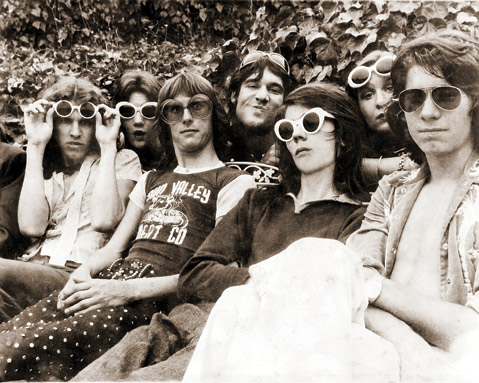
Every music scene has its inner circle of royalty. For five decades, Swingin’ Dave Collert served as Santa Barbara’s Duke Ellington of the guitar. From the 1960s through the 2000s, Collert listened to, analyzed, and played nearly every style of guitar, mastering rock, pop, and jazz from the inside out. When he finally settled on a musical home base in the 1970s, it was the style of Django Reinhardt that he took up and mastered seamlessly. Although it will be for his work as Swingin’ Dave — first in Cocktail and later in Tom Foolery and Hot Club — that Collert will be most remembered, he earned his place in music history several times over, not only as a prodigy guitar player, but also as a gifted composer and arranger and as an authority on guitars, technique, and equipment.
Born in Hollywood in 1952, Collert moved to Santa Barbara with his family when he was 9 years old. He formed his first band with longtime friend Jay Dee Daugherty when the two were students at La Cumbre Junior High. Daugherty would go on to fame as the drummer for Patti Smith, but it was in the company of Collert that he developed his style in early bands like Weirdo Stud (1968-69) and King Tut and the Space Queers (1970-74).

In 1973, Collert and Daugherty hooked up with Lance Loud, Kevin Loud, and Kristian Hoffman to form the Loud Band, a precursor to the Mumps. Lance Loud had just achieved national recognition for his involvement in the reality television program An American Family, and his band became a vehicle for some of the first openly gay sentiments in popular music. Critics today acknowledge the Mumps, Loud, and Hoffman’s next group as the greatest “lost” band of the New York New Wave scene, and many of the era’s best-known musicians cite them as an important influence.
Collert was with the group when they appeared as the Loud Band on The Dick Cavett Show on February 4, 1974. The group played “Muscle Boys,” a song that Collert cowrote with Lance, and the largely gay audience in the Ed Sullivan Theater, which included Andy Warhol, gave them a wild standing ovation. For Collert, this was a great moment because he was playing on the same stage his idols, the Beatles, had played 10 years before. With this performance, Collert entered not only rock history but also American history, as this was one of the watershed moments in the gay liberation movement — a national television broadcast of a glam-rock song celebrating same-sex attraction.
After working in N.Y.C. and visiting Paris, David returned to Santa Barbara and formed Cocktail with Grant Loud on vocals and thus entered into the prime of his years as an interpreter of standards and jazz classics. In the period 1971-89, he managed Fancy Music, a legendary gathering place and resource for the city’s music community. From there, he went on to co-own Sound Advice (1990-96). Brad Nack remembers buying guitars there, and how accepting and supportive Collert was of young musicians coming up through the ranks: “Dave came to some gigs that I played with Spencer Barnitz, and I know that we weren’t really all that together in those days. It was obvious that Swingin’ Dave was on another level musically, but he still showed up and offered us acknowledgement and respect, even when I’m pretty sure we didn’t deserve it.”
Collert also did session work in Los Angeles — meeting famous Wrecking Crew members like Tiny Timbrell and Tommy Tedesco, and working with Stewart Levin Productions. Raymond Kurzweil ran through the K250 Synthesizer with Dave, which led to a meeting with Bob Dylan.
Many people will also remember Swingin’ Dave’s famous cars, which included his well-known blue and red Citroëns, a Lamborghini, and a Rolls-Royce. From his automobiles to his hair and clothes to his ubiquitous sunglasses, Swingin’ Dave always had a charisma and style that influenced his many fans.
That personal style carried over into his relationships, marked by Collert’s romantic streak. Recent years found him sharing his life with fiancée and photographer Joanne A. Calitri. The couple was in New York City on a visit and planning to settle there when Collert died unexpectedly. He was working on new music at the time. In his words: “I’m mixing the sweetness of Django and the craziness of Charlie Parker.”
